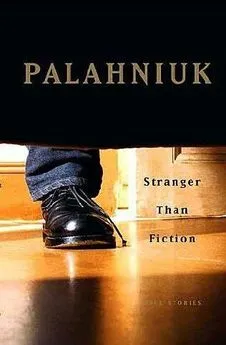Chuck Palahniuk - Stranger Than Fiction (True Stories)
- Название:Stranger Than Fiction (True Stories)
- Автор:
- Жанр:
- Издательство:неизвестно
- Год:неизвестен
- ISBN:нет данных
- Рейтинг:
- Избранное:Добавить в избранное
-
Отзывы:
-
Ваша оценка:
Chuck Palahniuk - Stranger Than Fiction (True Stories) краткое содержание
"Full of wonderful moments…Palahniuk's voice is so distinctive and intimate-he writes as though he is recounting a great story to a close friend." — Los Angeles Times
"Step into Palahniuk's dark worldview and watch for what crawls out. These stories are true to him and no one else." — The Oregonian
“One of the oddest and most oddly compelling collections to come along for some time.” —The Milwaukee Journal Sentinel
“In Chuck Palahniuk’s world, the ride is fast, often disturbing, and there is never any holding back.” —The New Orleans Times-Picayune
“Eccentric, idiosyncratic, and often entertaining.” —The Onion
"Priceless grace notes from an exceptionally droll and sharp-eyed observer." — The New York Times
“Rarely does a collection of essays continually resonate with a main theme and accumulate a weight that would lead you to call it a great book. . This is a pretty great book.” —The Seattle Times
"The book's lurid appeal rests largely on being let in on Palahniuk's secrets, the raw material for much of his fiction. . Acts that give spice to his novels are made more menacing when encountered in the real world." — Black Book
Stranger Than Fiction (True Stories) - читать онлайн бесплатно полную версию (весь текст целиком)
Интервал:
Закладка:
When the problem looks too big, when we're shown too much reality, we tend to shut down. We become resigned. We fail to take any action because disaster seems so inevitable. We're trapped. This is narcotization.
In a culture where people get too scared to face gum disease, how do you get them to face anything? Pollution? Equal rights? And how do you prompt them to fight?
This is what you, Mr. Ira Levin, do so very well. In a word, you charm people.
Your books, they're not so much horror stories as cautionary fables. You write a smart, updated version of the kind of folksy legends that cultures have always used-like nursery rhymes and stained-glass windows-to teach some basic idea to people. Your books, including Rosemary's Baby, The Stepford Wives, and Sliver, take some of the thorniest issues in our culture and charm us into facing the problem. As recreation. You turn this kind of therapy into fun. On our lunch breaks, waiting for a bus, lying in bed, you have us face these Big Issues, and fighting them.
What's creepy is, these are issues the American public is years away from confronting, but in each one-in each book-you ready us for a battle you seem to see coming. And, so far, you're always right.
In Rosemary's Baby, published in 1967, the battle is over a woman's right to control her own body. The right to good health care. And the right to choose an abortion. She's controlled by her religion, by her husband, by her male best friend, by her male obstetrician.
All this you got people to read-to pay money to read-years before the feminist health-care movement. The Boston Women's Health Cooperative. Our Bodies, Ourselves. And consciousness-raising groups where women would sit around with a speculum and flashlight and look at changes in each other's cervix.
You showed women exactly how not to be. What not to do. Do not just sit around your apartment sewing cushions for the window seats and not asking questions. Take some responsibility. If you get date-raped by the Devil, don't think twice about terminating that pregnancy. And, yes, it's silly. The Devil… And the fact he has a big, BIG erection. And Rosemary is tied down, spread-eagled by Jackie Kennedy, aboard a yacht during a storm at sea. What would Carl Jung make of all that? Nevertheless, that's what lets us inside. We can pretend this is all a fantasy. It's not real, abortion isn't a real issue. We can feel Rosemary's joy, her terror and rage.
Did you anticipate that now, in a creepy echo thirty years later, backlash against abortion rights gives the fetus a legal right to be born in many states? In courtrooms, women have become "gestation hosts" or "gestation carriers," forced by legal action to carry and give birth to children they don't want. Fetuses have become symbols for antiabortion foes to rally around. The way Rosemary's neighbors rallied around her baby in its black-draped crib.
Another funny, creepy part is-our body doesn't know this isn't real. We're so wrapped up in this story, we get a cathartic experience. A horrible adventure by proxy. Like Rosemary, we're smarter now. We're not going to make this same mistake. Nope. No more bossy doctors. No more sleazy husbands. No more getting drunk and being knocked up by the Devil.
And just in case, let's make abortion an okay, legal option. Case closed.
Mr. Levin, your skill to tell an important, threatening story through a metaphor, maybe it comes from your experience writing for television's "golden age," shows like Lights Out and The United States Steel Hour. This was television in the 1950s and early 60s, when most issues had to be masked or disguised to avoid offending a conservative audience and the even more conservative sponsors of a program. In a time before "transgressive fiction," such as The Monkey Wrench Gang, American Psycho, and Trainspotting, where a writer could stand on a soap box and shout about a social issue, your writing career started in this era, in the most public form of writing, when the mask, the metaphor, the disguise was everything.
Good theater and social commentary had to mix well with commercials for soap and cigarettes.
What's important is, it worked. And it still works. The fable lifts an issue free from its specific time and makes it important to people for years to come. The metaphor even becomes the issue, injecting it with humor, and giving people a new freedom to laugh at what had scared them before. Your best example of this is The Stepford Wives.
Published in 1972, the book shows a woman with a family and an embryonic career as a professional photographer. She's just moved out of the city, into the countryside town of Stepford. There, all the wives seem devoted to nothing except serving their husbands and families. They're all physical, big-breasted, pretty ideals. They clean and cook. And, well, that's it. Reading the book, we follow Joanna Eberhart and her two friends as, one by one, they give up their personal ambitions and resign themselves to cooking and cleaning.
The creepy part is, the Stepford husbands are killing their wives. Working as a group, the men are replacing the women with lovely, efficient robots that do everything asked of them.
The even creepier part is, you wrote this more than a decade before the rest of American culture noticed the men's «backlash» against women's liberation. It wasn't until the Pulitzer Prize-winning book Backlash, by Susan Faludi, that someone besides you acknowledged the idea that men might organize and fight to keep women in traditionally female roles.
And, yes, Backlash is an excellent book, and it makes its case by describing how male fashion designers dress women, and how antiabortion people dismiss women as just the vehicles for an unborn fetus, but the message there is so… strident. There's no charm here. Ms. Faludi points out a problem and piles on the evidence, but when the book is done, she leaves us with no feeling of resolution. No freedom. No personal transformation.
Worse-like in so much transgressive fiction, where the author gets to blatantly rant about problems-narcotization sets in. The message gets so blatant and relentless that people stop hearing it.
But in Stepford Wives, wow, we laugh with Bobbie and Joanna. We laugh a lot, all through the first half of the book. Then Charmaine disappears. Then poor Bobbie. Then Joanna. The horror cycle is complete. We've seen what happens when you play dumb and deny reality until it's too late. Now, all those nice homemakers rolling pie crust in clean, sunny kitchens, we see them as tainted, as manipulated and shaped. As Stepford wives.
Your silly, crazy robot metaphor, it's so… over the top. Crazy as it looks, it's replaced all the tired dogmatic rant about housework as demeaning, blah, blah, blah. Your Disney-female-robot-sex-slave-hausfrau metaphor is even better than your big-dick-Devil-date-rape metaphor.
You leave us with just the clear message: housework = death. A simple, memorable, modern fable. Do not let anyone make you into a Stepford wife. Develop your own career beyond being a wife.
In each book, you create a metaphor that allows us to face a Big Issue without being so confronted we give up hope and retreat. First, you charm us with humor, then you scare us with a worst-case scenario. You show us someone who gets trapped, who refuses to recognize and deal with the danger until it's too late.
You might not agree, but even in Sliver, published in 1991, the main character fails to wise up until it's too late.
Ten years before the rest of the world tuned into "reality television" and webcams hidden in tanning salons, locker rooms and public toilets, again you predict the battle over privacy in the face of new broadcast and video technology. In Sliver, Kay Norris moves into a lovely apartment on the twentieth floor of a narrow «sliver» building in Manhattan. She falls in love with a younger man, another resident of the building, not knowing he owns the building. And he's wired every apartment with hidden cameras that allow him to watch the residents as entertainment.
The darker secret of the "horror high-rise" is that as people discover their phones are bugged and their apartments are being spied on, the young building owner murders them. He even records the murders and keeps the tapes.
Like Rosemary Woodhouse and Joanna Eberhart, Kay thinks her apartment is a great new beginning. Despite fellow residents dying all around her, she clings to her denial and distracts herself with her love affair. In an interesting evolution from Rosemary (who had no career) through Joanna (who snapped a few pictures), Kay Norris is consumed by her job as a book editor. She's never been married. And she isn't destroyed by the reality she failed to recognize.
But only because her cat saves her-hardly her own doing.
Ten years before states realized they had no laws that forbid someone from carrying a camera in a suitcase, then standing in a crowd and filming up the bottom of women's skirts, a decade ago, you tried to warn us. This was possible. Technology had outdistanced law, and this was going to happen. Then you created a fable to get our attention and inoculate us against the fear by creating a metaphor, a character that models the wrong behavior.
Was it Plato who made his arguments by telling a story with an obvious flaw, and allowing the listener to realize the error? Whoever it was, that method gives the reader the moment of realization, the emotional moment of "ah-hah!" And teaching experts say that, unless we have that moment of chaos, followed by the emotional release of realization, nothing will be remembered. In this way you, Mr. Ira Levin, force us to remember the mistakes made by your characters.
Oh, Mr. Ira Levin, how do you do it? You show us the future. Then you help us deal with that scary new world. You take us, fast, straight through a worst-case scenario and let us live it.
In the therapy called "flooding," a psychologist will force a patient to endure an exaggerated scenario of his or her worst fear. To overload the emotions. A person afraid of spiders might be locked in a room filled with spiders. A person afraid of snakes might be forced to handle snakes. The idea is that contact and familiarity will dull the terror the patient has for something they've been too afraid to explore. The actual experience, the reality of what snakes feel like and how they act, it destroys the fear by contradicting the patient's expectation.
Is that it, Mr. Levin? Is that what you're up to?
Or is what you do just consolation? Showing us the worst so our lives look better by comparison. No matter how controlling our doctor seems, at least we're not giving birth to a devil baby. No matter how boring the suburbs feel, at least we're not dead and replaced by a robot.
Your fellow writer Stephen King once said that horror novels give us a chance to rehearse our deaths. The horror writer is like a Welsh "sin eater," who absorbs the faults of a culture and diffuses them, leaving the reader with less fear of dying. You, Mr. Levin, are almost the opposite. In big, funny, scary ways, you acknowledge our faults. The problems we're too afraid to recognize.
And by writing, you give us less to fear about living.
That's very, VERY creepy, Mr. Levin. But not creepy-bad. It's creepy-nice. Creepy-great.
Escort
My first day as an escort, my first «date» had only one leg. He'd gone to a gay bathhouse, to get warm, he told me. Maybe for sex. And he'd fallen asleep in the steam room, too close to the heating element. He'd been unconscious for hours, until someone found him. Until the meat of his left thigh was completely and thoroughly cooked.
He couldn't walk, but his mother was coming from Wisconsin to see him, and the hospice needed someone to cart the two of them around to visit the local tourist sights. Go shopping downtown. See the beach. Multnomah Falls. This was all you could do as a volunteer if you weren't a nurse or a cook or doctor.
Читать дальшеИнтервал:
Закладка:








